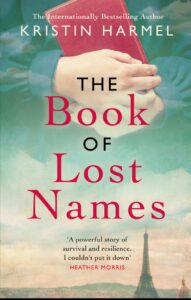
World war stories with their war crimes never cease to horrify us, but at the same time, certain books leave you in awe. Often enough you come across stories of normal human beings- men and women who come together putting their own lives at risk for the sake of humanity and that leaves you with rather a hopeful heart.
After reading two back-to-back books on similar themes- All the Light We Cannot See by Anthony Doerr and The Book of Lost Names by Kristin Harmel, I felt I had to put down my thoughts on how these amazing young men and women came to fight against the Nazis.
Eva Traube Abrams, a semi-retired, octogenarian librarian in Florida, shares an uneasy relationship with her assistant at the library. For the life of her, Eva can’t understand how her assistant at her library cannot understand what it means to love books so passionately that you would die without them, that you would simply stop breathing, stop existing. But to the librarian, Eva is just a senile old woman who should stay back home. Eva realizes quite ruefully that one’s reward for marching through the decades is a gradual process of erasure.
When Eva chances upon an image of a man in the newspaper, holding a religious book she freezes as she recognizes the book. The news snippet goes on to say that the German Librarian is trying to reunite the looted books with their rightful owners sixty years after the end of World War II. He speaks about finding some sort of code in the book, which he is unable to decipher. She recalls the time when she along with Remy had entered the code of those Jew children whose papers were forged by her to help them escape. To her, it would always be, The Book of Lost Names.
The book unravels as a flashback. Eva enjoying an idyllic life with her parents is forced to escape with her mother after her father is taken by the Nazis and transported to a camp. She uses her gift of calligraphy to forge documents for herself and her mother. When she realizes the potential that her gift holds, she uses it to forge documents of Jewish children and help them cross the border to safety. In the haven of a church on the outskirts of Paris, She, Remy, and many more ordinary citizens are involved in this dangerous operation of resistance against German Nazis. As the children are taken away from their parents, she and Remy devise a code to make sure that the children are not lost to their real selves. She lands in Berlin exactly sixty-years to the day, Germans signed the unconditional surrender to the Allies. Right from the love of books that she inherits from her father to their escape and her mother’s inability to handle the loss of her husband, home and the life she knew and Eva’s struggle to not only take care of her mother but also help in the war and her romance with Remy , is what makes this book a riveting read.
Their dream run for helping children escape comes to an end when they are let down by one of their own. As Eva returns to decipher the code of those children whose identity she was forced to steal, we also get a chance to find out about the fate of other members including Remy who we fall in love with!
Eva had kept her past a secret from Louis her husband and also Ben, her son. As Ben was born after eight years post-war, he had seen her simply as a mother and a librarian. Traveling to Berlin without letting her family know, she rightly ruminates, But when you grow comfortable hiding within a protective shell, it’s harder than one might expect to stand up and say, “Actually, folks, this is who I am.”
Along with this interesting story line we get to learn some home truths about parenting journey. Parents make all sorts of errors, because our ability to raise our children is always colored by the lives we’ve lived before they came along. Eva realizes that her mother’s inability to move ahead was because she viewed the situation through the scope narrowed by anger and loss and that somehow resonates with how we all view our lives even today.
Throughout the story, books play a major part. Be it her inherited love for books, or using a book to enter the code or having a bookshop and its owner or a library, as a front for their resistance movement, books play an important role. Along with Eva, we muse, That’s what books were for, after all. They were passageways to other worlds, other realities, other lives one could imagine living. But in times like these, was it dangerous to dream unrealistic dreams?
I had read this book a few months ago but this quote from the book remains with me: “I used to think that memories were less painful when you held them close. I think perhaps that isn’t true, though. Now I think pain loses its power when we share it.”
![]()
